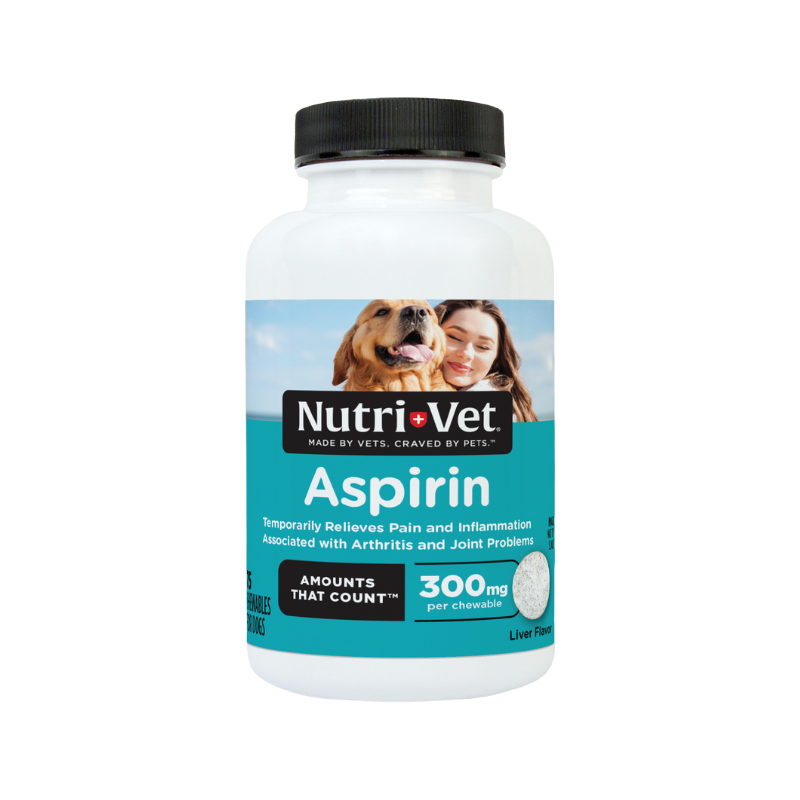Aspirin for Dogs: Dosage, Benefits, Risks, and When to Use It Safely
As caring pet owners, we know that our dogs’ well-being is a top priority. Part of ensuring their health involves addressing pain and discomfort when it arises. One common tool in managing canine pain is aspirin, but its use must be approached with caution and knowledge. In this comprehensive guide, we will explore the ins and outs of aspirin for dogs, covering essential topics like proper dosage, potential benefits, associated risks, and when it’s safe to use. Whether you’re a seasoned dog owner or a new pet parent, understanding aspirin’s role in your dog’s pain management can make a significant difference in their quality of life.
Canine Pain Management
Canine pain can arise from various sources, including injuries, surgery, arthritis, or underlying medical conditions. The well-being of our furry companions depends on effective pain management. Aspirin, a non-steroidal anti-inflammatory drug (NSAID), has been a go-to choice for many dog owners seeking to alleviate their pets’ discomfort. It can help reduce pain and inflammation, improving your dog’s mobility and overall comfort.
Understanding Aspirin for Dogs
What is aspirin?
Aspirin, also known as acetylsalicylic acid, is a widely recognized medication for pain relief and inflammation in both humans and dogs. It belongs to a class of drugs called non-steroidal anti-inflammatory drugs (NSAIDs). In dogs, aspirin works by inhibiting specific enzymes that trigger pain and inflammation.
Key Differences Between Human and Dog Aspirin:
While the active ingredient in human aspirin is the same as that in canine aspirin, there are crucial differences between the two. Dog-specific aspirin formulations are available and should be used to ensure proper dosing and minimize risks. Human aspirin may contain additives or ingredients that can be harmful to dogs.
When to Consider Aspirin for Dogs
Deciding when to use aspirin for your dog is a critical aspect of responsible pet ownership. While aspirin can be a valuable tool, it should only be considered under specific circumstances:
Specific Scenarios Where Aspirin Might Be Considered:
Post-Surgical Pain:
After surgical procedures, dogs may experience pain and inflammation. In such cases, your veterinarian may prescribe aspirin for short-term pain relief.
Arthritis and Joint Pain:
Dogs with arthritis or joint issues may benefit from aspirin’s anti-inflammatory properties. However, it’s essential to consult with your vet for a proper diagnosis and treatment plan.
Soft Tissue Injuries:
Aspirin can help manage pain caused by soft tissue injuries or muscle strains. Again, consulting your vet for guidance is crucial.

Benefits of Aspirin for Dogs
Aspirin offers several potential benefits when used correctly for dogs:
Potential Benefits of Aspirin for Dogs:
Pain Relief:
Aspirin can provide relief from various types of pain, including acute and chronic pain.
Inflammation Reduction:
Its anti-inflammatory properties can help reduce swelling and inflammation associated with injuries or conditions like arthritis.
Improved Mobility:
Dogs with joint issues or arthritis may experience improved mobility and comfort with aspirin use.
Risks and Side Effects
While aspirin can be beneficial, it’s crucial to be aware of the potential risks and side effects associated with its use in dogs:
Potential Risks and Side Effects of Aspirin for Dogs:
Kidney and Liver Problems:
Prolonged or high-dose aspirin use can affect a dog’s kidney and liver function.
Allergic Reactions:
Some dogs may be allergic to aspirin, leading to symptoms like itching, hives, or swelling.
Aspirin Dosage for Dogs
Proper dosage is crucial when using aspirin for dogs to maximize benefits while minimizing risks. Here, we provide clear guidance on how to determine and administer the correct dosage:
Understanding Aspirin Dosage for Dogs:
Veterinary Consultation:
Always consult your veterinarian before giving aspirin to your dog. They will assess your dog’s health, condition, and specific needs to determine the right dosage.
Dog’s Weight Matters:
Dosage is often based on your dog’s weight. Different dosages are recommended for small, medium, and large breeds.
Prescription vs. Over-the-Counter (OTC):
Your vet may prescribe a specific aspirin formulation designed for dogs, or they may recommend an OTC option. Ensure you use the recommended type.
Exploring Alternatives to Aspirin:
Prescription Medications:
Your vet may prescribe other pain medications specifically designed for dogs, such as NSAIDs or opioids.
Holistic Approaches:
Some pet owners explore holistic therapies like acupuncture, physical therapy, or dietary supplements to manage pain.
Diet and Weight Management:
Maintaining a healthy diet and managing your dog’s weight can significantly impact joint health and overall comfort.
How to Administer Aspirin to Dogs
Proper administration of aspirin is essential to ensure your dog receives the intended benefits:
Tips for Administering Aspirin to Dogs:
With Food:
Give aspirin with a meal or a small treat to minimize the risk of stomach upset.
Whole or Crushed:
Depending on your dog’s preference, you can administer the tablet whole or crush it and mix it with food.
The Importance of Monitoring and Follow-Up:
Regular Vet Visits:
Schedule follow-up appointments with your vet to evaluate your dog’s response to aspirin and address any concerns.
Monitoring Symptoms:
Keep an eye on your dog’s condition and be vigilant for signs of improvement or deterioration.
Case Studies and Testimonials
Real-life experiences can provide valuable insights into the effectiveness and safety of aspirin for dogs. Here, we share case studies and testimonials to illustrate how aspirin has positively impacted dogs’ lives:
Success Stories with Aspirin for Dogs:
Improved Mobility:
Highlight a case where a dog with arthritis regained mobility and a better quality of life with aspirin.
Post-Operative Comfort:
Share a case where aspirin played a crucial role in a dog’s comfortable recovery after surgery.
Common FAQs about Aspirin for Dogs
Is aspirin safe for dogs?
Explain that aspirin can be safe when used under veterinary supervision but can pose risks if administered improperly.
What are the side effects of aspirin in dogs?
Detail potential side effects, emphasizing the importance of monitoring and professional guidance.
Can I use human aspirin for my dog?
Stress the need for dog-specific aspirin formulations and the dangers of using human aspirin.
How do I know the right aspirin dosage for my dog?
Encourage readers to consult their veterinarian for personalized dosing guidance.
Are there natural alternatives to aspirin for pain management in dogs?
Briefly mention holistic approaches and the importance of discussing options with a vet.
Conclusion
In conclusion, aspirin can be a valuable tool in managing pain and inflammation in dogs when used responsibly and under professional guidance. We’ve covered essential aspects of aspirin for dogs, including when to consider its use, benefits, potential risks, proper dosing, alternatives, administration tips, monitoring, and real-life experiences. Remember that the well-being of your canine companion should always be the top priority, and consulting your veterinarian is key to safe and effective pain management.




